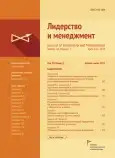Том 10, № 2 (2023)
- Год: 2023
- Статей: 20
- URL: https://journals.eco-vector.com/2410-1664/issue/view/8087
Статьи
Мозаичный эмоционально-поведенческий дубликатор в адаптационном управлении развитием бизнеса в его мобилизационном формате
Аннотация
 367-388
367-388


Социальные ориентиры и проблемы целеполагания в некоммерческих организациях России
Аннотация
Обоснована высокая актуальность вовлечения активной части общества в процессы трансформации социально-экономической жизни в стране. Обсуждаются базовые понятия идеалов и ценностей, целей и целеполагания в контексте форм человеческой активности и деятельности организаций. Анализируется пригодность концептуальных наработок по теории целенаправленной информации В.И. Корогодина, теории развития творческой личности Г.С. Альтшуллера-И.М. Верткина и др. применительно к процессам целеполагания деятельности отечественных социально-ориентированных некоммерческих организаций. С этих позиций на примере Челябинской области проведен обзор и анализ целеполагания (миссий) некоммерческих организаций. В работе подтверждена гипотеза использования системы качеств творческой личности для планирования и реализации деятельности организаций, приведены инструменты поиска надежных социальных ориентиров и решена проблема четкого формулирования целей деятельности.Статья будет интересна руководителям некоммерческих организаций, студентам вузов экономической направленности, научным работникам и аспирантам, а также широкому кругу читателей, интересующихся вопросами развития некоммерческого сектора
 389-410
389-410


Актуальные проблемы управления группами компаний
Аннотация
 411-424
411-424


Мультидисциплинарные команды как фактор устойчивости компаний в современных условиях
Аннотация
 425-438
425-438


Критерии оценки эффективности работы команды в системе продаж
Аннотация
 439-450
439-450


Корпоративная модель компетенций предприятия железнодорожного транспорта
Аннотация
 451-470
451-470


Управление развитием компетенций менеджеров
Аннотация
 471-486
471-486


Характеристика направлений развития цифрового лидерства для эффективного управления организационными изменениями в цифровой экономике
Аннотация
 487-506
487-506


Особенности управления персоналом в региональных проектах
Аннотация
 507-522
507-522


Изучение влияния кадрового потенциала на развитие промышленных предприятий
Аннотация
 523-532
523-532


Современные методы оценки качества персонала как инструмент повышения эффективности бизнес-процессов предприятий
Аннотация
 533-546
533-546


Инновационные технологии в управлении персоналом: опыт применения
Аннотация
 547-560
547-560


Карьерное развитие молодежи в экосистеме кадрового партнерства вуза
Аннотация
 561-578
561-578


Центры проектной деятельности как элемент экосистемы предпринимательства в университетах
Аннотация
 579-596
579-596


Организационно-деятельностная игра как инструмент проектного управления при реализации стратегии цифровой трансформации университета
Аннотация
 597-612
597-612


Роль института кураторства в формировании организационной культуры вуза
Аннотация
 613-630
613-630


Внедрение системы экологического менеджмента в высшем учебном заведении
Аннотация
 631-642
631-642


Совершенствование управления устойчивым развитием бизнеса в России на основе принципов социальной и экологической ответственности с помощью ESG-менеджмента
Аннотация
 643-656
643-656


Методика исследования культурного кода компании в корпоративно-антропологическом подходе с применением инструментов фасилитации и сторитейлинга для обеспечения устойчивого развития организации
Аннотация
 657-672
657-672


Теоретические аспекты реализации бережливого управления в системе региональной власти
Аннотация
 673-684
673-684













